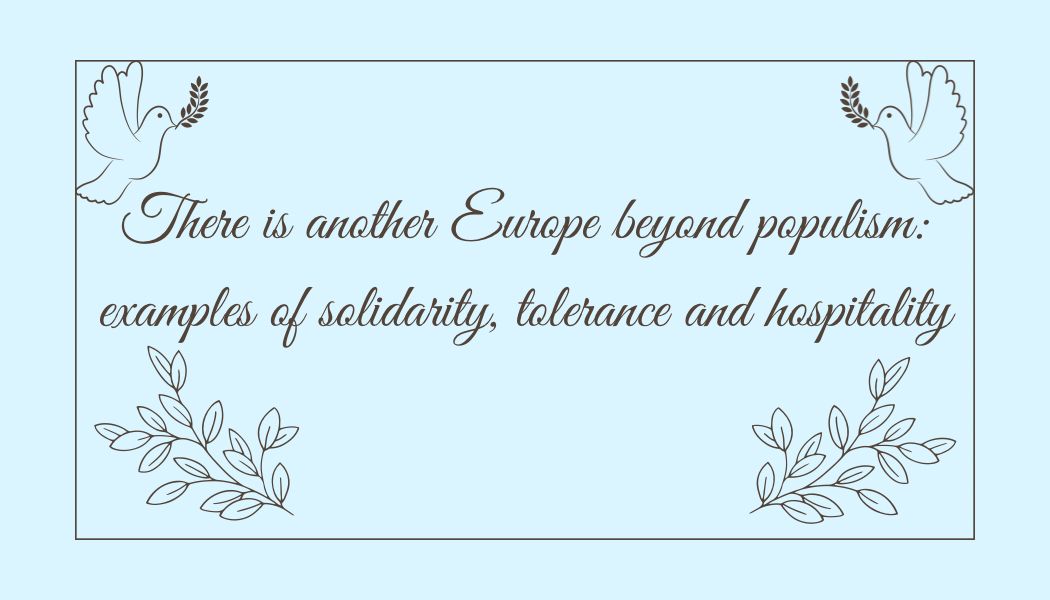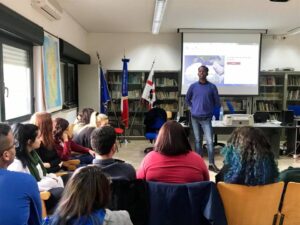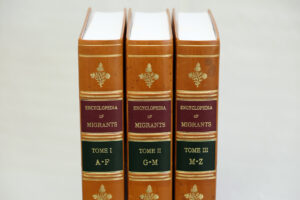- 2021/11/16
There is another Europe beyond populism: examples of solidarity, tolerance and hospitality

Giulia Marasca
According to the latest estimate released by UNHCR, the number of displaced people registered at the end of 2020 amounts to 82.4 million. Among the above, 48.000 million of people are those internally displaced, 26.4 million are refugees and 4.1 million are asylum-seekers[1]. Furthermore, as far as their place of origin is concerned, more than two thirds of all refugees came from Syria, Venezuela, Afghanistan, South Sudan and Myanmar[2].
The increased number of refugees entering Europe within the so-called refugee crisis has led to populist parties’ gaining more political power in most European countries. Some examples thereof include the Alternative für Deutschland (AfD) in Germany, which was the country’s third political party in 2017, or the Northern League in Italy, considered the first political force of the country during the European elections of 2019. Moreover, a study conducted by Gallup has demonstrated that over the period from 2016 until 2019, there has been a decrease in the level of acceptance for migration among the general population. The study’s outcome comprises of the results obtained through the application of an index to several interviews conducted in 140 countries. The respondents were asked to answer three questions, each of which included a grading scale ranging between 0 and 3, with the former corresponding to “bad” and latter to “good”. These questions were related to their view of migrants living in their country, neighbourhood, and becoming part of their families through marriage. The worldwide general score has registered a decrease from 5.34 to 5.21[3].
However, even though it is important to monitor the impact of populist parties as related to the feeling of the general population, it is equally necessary to bear in mind that during the past few years, we have witnessed practices demonstrating that a successful integration is possible and that steps have been taken at both civil society and institution levels to favour the creation of an intercultural society.
Therefore, on the occasion of the International Day of Tolerance, it is fundamental to put the stress on those initiatives which corroborate that a different response is attainable and that Europe is more than the rise of populist parties. There is a Europe made of solidarity, inclusion, and integration. To prove it, in this article we are going to mention in this article initiatives undertaken both by civil society organisations and those undertaken at a higher institutional level.
An example of solidarity is represented by projects which have been implemented with the objective of giving voice to refugees and asylum-seekers. One of them is called “Finestre – storie di rifugiati” organised by Fondazione Centro Astalli in Rome. This project was first implemented in 2002 and it is still ongoing nowadays. The core of the project involves the organisation of meetings where refugees are asked to give speeches to secondary schools students. In this way, the Fondazione Centro Astalli wants to go beyond the narrative of numbers and data, to include empathy and understanding which can be only developed through the direct contact with those who have been forced to leave their country. The power of this project is that schools which want to adhere are not left alone when it comes to frame the meeting. Indeed, they are provided with materials which are fundamental to prepare students for what they are going to listen to. This material concerns information about human rights, international protection, the condition of women and children in the migratory process, and the challenges of creating an intercultural society[4].
Source: Centro Astalli, Oggi per il progetto #Finestre siamo al Liceo E. Lussu di Sant’Antioco, in Sardegna. Insieme ai giovani costruiamo le basi per una società interculturale #ascuolaconAstalli, Facebook, 15 March 2019, https://www.facebook.com/CentroAstalli/posts/10156496512631312?comment_id=10156496818286312&comment_tracking=%7B%22tn%22%3A%22R%22%7D
A second example is represented by the project named Encyclopedia of Migrants, an initiative which was developed through the collaboration of eight cities in three different countries, France, Spain, and Portugal, respectively. Through the recollection of the personal experiences of 400 migrants, who were asked to write a letter to a person who had remained in their country of origin, the purpose is supposed to present a subjective meaning of the concept of migrating. A particular focus was dedicated to the complexity of identity formation and the difficulties related to finding a new equilibrium between two cultures. Furthermore, not only does the encyclopedia include the testimonies of migrants who are living in the country of destination, but also of those who, after having migrated, have decided to come back to their country of origin. The recollection of testimonies in the form of an encyclopedia is not accidental. On the contrary, it has a special intention. The idea of gathering the experiences in a form resembling the 18th century encyclopedia, which was a collection of the universal knowledge, means that these testimonies represent the knowledge Europe will need to reconstruct itself. The stories of migrants play, therefore, a pivotal role in the building the history as well as of the future of Europe[5].
Source: http://www.encyclopedia-of-migrants.eu/en/encyclopedie/
Moving from examples connected with the civil society to those related to a more institutional environment, the city of Ghent, Belgium could be seen as a successful case of promoting solidarity towards migrants. Indeed, the city responded to the increasing numbers of refugees arriving in 2015 with the establishment of the so-called “Refugee Taskforce”. This approach is based on the idea that integration should not wait. In other words, the aim was to avoid forcing asylum-seekers to stay in the temporal limbo and wait for several years for the response without being able to find employment while remaining isolated from the host society. This Refugee Taskforce wants to start the integration process from the first day of arrival. This is done through the creation of a political body which involves different departments, such as the ones of Welfare, Health, Education and Youth. These departments are organised to create various working groups specialised in different areas of migration management. They are reception, integration, volunteering and awareness-raising. Furthermore, the collaboration of different actors, including NGOs, administrative bodies and individual citizens, plays a pivotal role.
One of the initiatives promoted by the Taskforce that have been more successful is the buddy program. This is aimed at helping the newcomers immediately integrate with the local community and expand the network of people they know. This buddy system which lasts from 3 to 6 months has been considered the key for migrants to better cope with initial difficulties such as finding a home, getting oriented in the city, or handling the administrative bureaucracy. The advantage of having a buddy is two-fold. Not only do refugees find a concrete answer to problems, but they can find a real connection with the local community, which can then have an impact on their employability[6].
The last example of solidarity can be found in the response different European cities have given after the Taliban take-over of Afghanistan. Indeed, from the middle of August 2021, we have witnessed cities working in conjunction with NGOs to receive Afghan refugees. Several mayors have spoken up for the reception of refugees, such as the Mayor of London Sadiq Khan, the Munich’s Deputy Mayor, Verena Dietl, the Mayor of Barcelona, Ada Colau or the Mayor of Milan, Beppe Sala[7]. These demonstrations of solidarity have shown, however, another side of the coin. Indeed, problems have been raised concerning the lack of concrete plans for refugees to be integrated in the cities. An example is the UK case where no clear plans have been formulated about long-term accommodation of refugees who spent most of the time in hotel rooms with the risk of worsening their mental health conditions, a concrete threat especially among the youngest[8]. Having said that, we certainly cannot underestimate the consequences and side-effects the lack of good planning can have on people. However, it is equally crucial to continue to shed light on the positive side of the coin in order to use it as a solid foundation for finding proper solutions to enhance the situation of people in distress.
On the occasion of the International Day of Tolerance, we wanted to remind with this article that beyond populist narratives and beyond episodes of intolerance, which unfortunately are still present in our society, there is another Europe. There is a Europe which is made of people ready to build a different type of society; we are talking about a society of solidarity, tolerance, and respect where every life counts.
[1] UNHCR (2021) Refugee Data Finder [online] available at https://www.unhcr.org/refugee-statistics/ [last accessed 06-11-2021].
[2] ibid.
[3] ESIPOVA, N; RAY, J; PUGLIESE, A (2020) World Grows Less Accepting of Migrants [online] available at https://news.gallup.com/poll/320678/world-grows-less-accepting-migrants.aspx [last accessed 06-11-2021].
[4] Fondazione Centro Astalli (nd) FINESTRE [online] available at https://www.centroastalli.it/category/cosa-facciamo/attivita-nelle-scuole/finestre/ [last accessed 06-11-2021].
[5] The Encyclopedia of Migrants (nd) [online] available at http://www.encyclopedia-of-migrants.eu/en/projet/ [last accessed 06-11-2021].
[6] Verheye, P (2018) Anticipating the exodus, Ghent Refugee Taskforce, [online] available at https://stad.gent/sites/default/files/page/documents/170609_Ghent_refugee%20taskorce-_ENG_v2_LR.pdf [last accessed 07-11-2021].
[7] Berretta, D; Banek, I (2021) Cities say yes to Afghan refugees [online] available at https://eurocities.eu/latest/cities-say-yes-to-afghan-refugees/ [last accessed 07-11-2021].
[8] Gentleman, A; Pidd, H (2021) Afghan refugees may be housed in UK hotels for up to a year, say councils [online] available at https://www.theguardian.com/world/2021/oct/21/afghan-refugees-may-be-housed-in-uk-hotels-for-up-to-a-year-say-councils [last accessed 07-11-2021].





